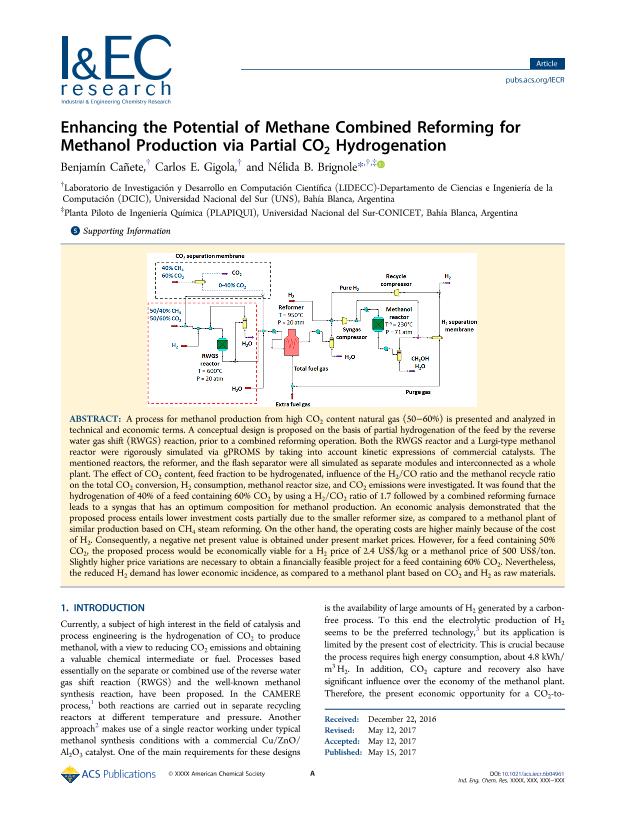Mostrar el registro sencillo del ítem
dc.contributor.author
Cañete, Benjamin

dc.contributor.author
Gigola, Carlos Eugenio

dc.contributor.author
Brignole, Nélida Beatriz

dc.date.available
2017-11-21T18:25:04Z
dc.date.issued
2017-05-15
dc.identifier.citation
Cañete, Benjamin; Gigola, Carlos Eugenio; Brignole, Nélida Beatriz; Enhancing the Potential of Methane Combined Reforming for Methanol Production via Partial CO 2 Hydrogenation; American Chemical Society; Industrial & Engineering Chemical Research; 56; 22; 15-5-2017; 6480-6492
dc.identifier.issn
0888-5885
dc.identifier.uri
http://hdl.handle.net/11336/28653
dc.description.abstract
(Figure Presented) A process for methanol production from high CO2 content natural gas (50-60%) is presented and analyzed in technical and economic terms. A conceptual design is proposed on the basis of partial hydrogenation of the feed by the reverse water gas shift (RWGS) reaction, prior to a combined reforming operation. Both the RWGS reactor and a Lurgi-type methanol reactor were rigorously simulated via gPROMS by taking into account kinetic expressions of commercial catalysts. The mentioned reactors, the reformer, and the flash separator were all simulated as separate modules and interconnected as a whole plant. The effect of CO2 content, feed fraction to be hydrogenated, influence of the H2/CO ratio and the methanol recycle ratio on the total CO2 conversion, H2 consumption, methanol reactor size, and CO2 emissions were investigated. It was found that the hydrogenation of 40% of a feed containing 60% CO2 by using a H2/CO2 ratio of 1.7 followed by a combined reforming furnace leads to a syngas that has an optimum composition for methanol production. An economic analysis demonstrated that the proposed process entails lower investment costs partially due to the smaller reformer size, as compared to a methanol plant of similar production based on CH4 steam reforming. On the other hand, the operating costs are higher mainly because of the cost of H2. Consequently, a negative net present value is obtained under present market prices. However, for a feed containing 50% CO2, the proposed process would be economically viable for a H2 price of 2.4 US$/kg or a methanol price of 500 US$/ton. Slightly higher price variations are necessary to obtain a financially feasible project for a feed containing 60% CO2. Nevertheless, the reduced H2 demand has lower economic incidence, as compared to a methanol plant based on CO2 and H2 as raw materials.
dc.format
application/pdf
dc.language.iso
eng
dc.publisher
American Chemical Society

dc.rights
info:eu-repo/semantics/openAccess
dc.rights.uri
https://creativecommons.org/licenses/by-nc-sa/2.5/ar/
dc.subject
Co2 Utilization
dc.subject
Rwgs
dc.subject
Combined Reforming
dc.subject
Methanol
dc.subject
Npv Analysis
dc.subject.classification
Otras Ingeniería Química

dc.subject.classification
Ingeniería Química

dc.subject.classification
INGENIERÍAS Y TECNOLOGÍAS

dc.title
Enhancing the Potential of Methane Combined Reforming for Methanol Production via Partial CO 2 Hydrogenation
dc.type
info:eu-repo/semantics/article
dc.type
info:ar-repo/semantics/artículo
dc.type
info:eu-repo/semantics/publishedVersion
dc.date.updated
2017-11-03T19:34:09Z
dc.journal.volume
56
dc.journal.number
22
dc.journal.pagination
6480-6492
dc.journal.pais
Estados Unidos

dc.description.fil
Fil: Cañete, Benjamin. Consejo Nacional de Investigaciones Científicas y Técnicas. Centro Científico Tecnológico Conicet - Bahía Blanca. Planta Piloto de Ingeniería Química. Universidad Nacional del Sur. Planta Piloto de Ingeniería Química; Argentina. Universidad Nacional del Sur. Departamento de Ciencias e Ingeniería de la Computación. Laboratorio de Investigación y Desarrollo en Computación Científica; Argentina
dc.description.fil
Fil: Gigola, Carlos Eugenio. Consejo Nacional de Investigaciones Científicas y Técnicas. Centro Científico Tecnológico Conicet - Bahía Blanca. Planta Piloto de Ingeniería Química. Universidad Nacional del Sur. Planta Piloto de Ingeniería Química; Argentina. Universidad Nacional del Sur. Departamento de Ciencias e Ingeniería de la Computación. Laboratorio de Investigación y Desarrollo en Computación Científica; Argentina
dc.description.fil
Fil: Brignole, Nélida Beatriz. Consejo Nacional de Investigaciones Científicas y Técnicas. Centro Científico Tecnológico Conicet - Bahía Blanca. Planta Piloto de Ingeniería Química. Universidad Nacional del Sur. Planta Piloto de Ingeniería Química; Argentina. Universidad Nacional del Sur. Departamento de Ciencias e Ingeniería de la Computación. Laboratorio de Investigación y Desarrollo en Computación Científica; Argentina
dc.journal.title
Industrial & Engineering Chemical Research

dc.relation.alternativeid
info:eu-repo/semantics/altIdentifier/url/http://pubs.acs.org/doi/abs/10.1021/acs.iecr.6b04961
dc.relation.alternativeid
info:eu-repo/semantics/altIdentifier/doi/http://dx.doi.org/10.1021/acs.iecr.6b04961
Archivos asociados
